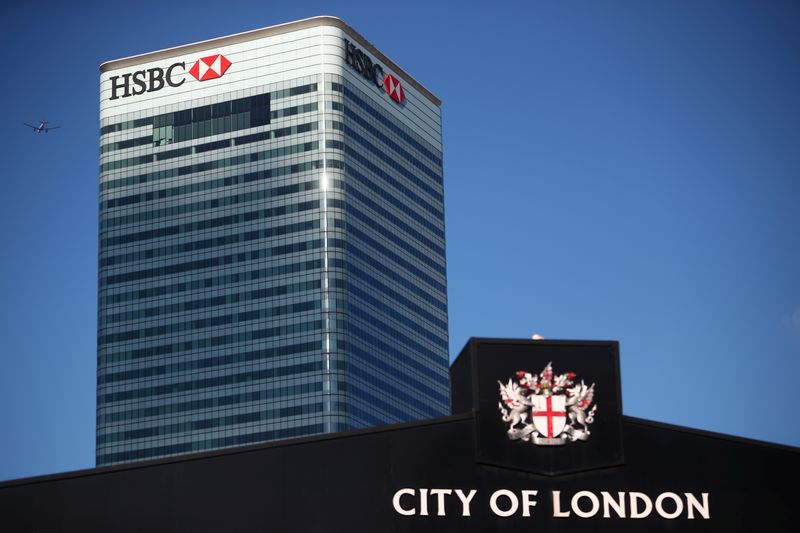By Iain Withers and Sinead Cruise
LONDON (Reuters) -HSBC has been fined 57.4 million pounds for "serious failings" in protecting up to 112 billion pounds ($142 billion)of deposits over several years, in the first penalty of its kind under UK rules designed to protect customers if banks fail.
The Bank of England's Prudential (LON:PRU) Regulation Authority (PRA) said on Tuesday that HSBC (LON:HSBA) failed to accurately identify deposits eligible for Britain's Financial Services Compensation Scheme (FSCS) - which protects customer cash up to 85,000 pounds.
This is the second largest fine ever imposed by the PRA, topped only by an 87 million pound penalty on Credit Suisse (SIX:CSGN) in July 2023 over its dealings with family office Archegos.
"The serious failings in this case go to the heart of the PRA's safety and soundness objective," said Sam Woods, deputy governor of the Bank of England and CEO of the PRA.
"It is vital that all banks comply fully with our requirements around preparedness for resolution."
UBS's takeover of its Swiss rival Credit Suisse in March has raised concerns about whether the too-big-to-fail regulatory framework that emerged from the financial crisis in 2008 is fit for purpose.
Globally systemically important banks -- such as HSBC and UBS -- are required to plan for resolution, which should allow regulators to unwind them without triggering broader systemic consequences.
Britain's deposit protection rules require banks to ensure critical information is held in order for the FSCS to compensate customers if a firm fails. The scheme is funded by firms authorised by the PRA and Financial Conduct Authority.
The PRA's final notice said HSBC found the majority of client accounts held at its non-ring-fenced bank were incorrectly identified as ineligible for FSCS protection. HSBC's non-ring-fenced bank split from its UK retail bank in 2018 to comply with post-financial crisis rules to protect customers from volatile investment banking.
The bank said its process for producing FSCS reporting incorrectly excluded deposits made by financial services firms, even if deposits in those accounts belonged to clients who were eligible for FSCS protection.
The BoE said the errors would have "materially undermined" any efforts by regulators to wind up the bank.
"Inaccurate information provided by PRA-authorised firms to the FSCS hampers the ability of the FSCS to make quick pay outs in the event of resolution, undermines trust in FSCS protection, and poses systemic risk," the final notice said.
The PRA did not at any time during the period of investigation assess that HSBC's ring-fenced or non-ring-fenced banks were failing or likely to fail.
Thomas Roulet, professor of leadership at the University of Cambridge told Reuters the prospect of bank failures and the implications of such events were only a distant possibility but should serve as "a wake up call" for customers.
HSBC said it was pleased to have resolved the matter, which it described as "historic".
"The PRA's final notice recognises the bank's co-operation with the investigation, as well as our efforts to fully resolve these issues. We continue to remain focused on serving our customers," an HSBC spokesperson said.
The failings occurred at HSBC Bank plc between 2015 and 2022, and at HSBC UK Bank plc between 2018 and 2021, the PRA said.

The PRA reduced HSBC's fine to 57 million pounds from 96.5 million pounds in return for the bank's co-operation with the investigation, the regulator added.
($1 = 0.7888 pounds)